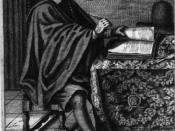An Intelligent Debate
There has been an ongoing debate
between scientists and philosophers
concerning the potential of nonhuman
animal intelligence. This essay will
provide a brief view of both sides
most compelling arguments.
Many philosophers, such as Rene
Descartes , believe that nonhuman
animals are thoughtless creatures of
instinct and reflex. Descartes argues
that speech is definitive of thought.
The lack of speech such as in
nonhumans, he believed, is proof that
humans are the only intelligent
creatures. There are obvious flaws in
this view if one takes into account a
talking parrot, for example. To such
and objection Descartes would respond
with the simple argument that the
parrot has no language, but is simply
able to mimic auditory noises that
reward him upon successful
completion. Descartes is not alone in
his holdings for nonhuman
intelligence. Some scientists explain
that many of the fetes performed by
nonhuman animals from the behaviorist
standpoint that accredits animal
behavior to simple stimulus response
reflexes. Assuming this to be true,
the reason your dog will run to the
kitchen when you get his food is his
conditioned response to the stimulus
of you entering the kitchen. Another
proposed explanation for the way
animals behave, not conceptually far
from behaviorism, is a trial and error
method explanation of behavior.
Scientists that support this claim
will use an explanation of repetitive
attempts to accomplish any task until
a successful attempt is realized.
This suggests that there is no
contemplative quality to the process
other than success or failure.
The opposite side of this view has
many reasons for its support of
nonhumananimal intelligence. One of
the most impressive is that of mental
mapping. Demonstrated in various
species, mental mapping shows the
capacity for nonhuman animals to have
a mental concept of the...


